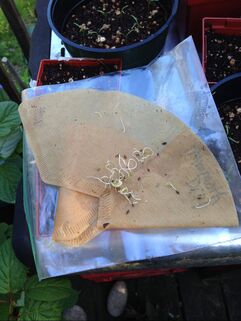 My first experience with soaking seeds was probably with something large, like sugar snap pea seeds. My second experience was probably with something like white beans, which hate to be soaked and often respond by rotting if you are not super careful. At the time, I had no idea there was a process called “priming.” Some kinds of seeds (grass seed) may be sold “primed.” This mean’s it’s been presoaked and then dried again so that it will sprout more quickly when planted in a lawn. The downside is that primed seeds do not have the shelf life of unprimed seeds. It’s a “use it or lose it” situation. When you create and care for client veggie gardens as I do, it can be a bit of a balancing act. Some veggies need to stay moist to germinate, a challenge if nobody is at the house to water. If I’m also taking care of some landscape needs at the house down the road, it’s no big deal to check in on the carrots-to-be, for example. When I'm not able to be at the garden often, pre-sprouting helps. Priming and warming those pepper and tomato seeds can also speed up plant development by a few days. When plants are tricky to start from seed in the garden, starting seeds indoors allows me to control and optimize the growing conditions. This year, I have a client who wants dill in her doorstep herb container garden. Dill, you may know, is not a fan of being transplanted. It often bolts not long after transplanting, so I can see some succession plantings on the horizon. I decided to experiment with priming dill seeds so I could plant some seedlings in the doorstep pot, while starting some seeds that will come out from backstage when the first batch starts to get tired out and go to seed. Here’s what I did:
Not all seeds respond equally well to being soaked. Arugula seeds, for example, get a mucilaginous coating and clump together. White beans are easy to over-soak, resulting in rotten beans. Some seeds need heat to germinate well (tomatoes, eggplant, peppers); others refuse to germinate with too much heat (lettuce!). It helps to look up optimal germination temperatures for the seeds you're starting. As to heat: If it's not a seed that will sprout easily at room temperature, then a heat source is needed. Very few refrigerator tops are as hot as those our grandparents' appliances used to start seeds, but presoaked seeds in moist coffee filters tucked into plastic bags, wrapped in a towel, and placed against a heating pad will move pepper and tomato seeds along nicely, using less heat than would mats to heat numerous trays. Once the seeds start to show roots, they can be transplanted into cells, trays or pots. (Oh, by the way: Not all heating mats are well quality controlled, and I have a scorched wooden table top to prove it!) Does seed starting still seem too daunting? My advice is simple: Just. Do. It. Seed starting is thrilling. I like to bring a sense of adventure to working with seeds — trying something I have never even tasted, experimenting with pushing seed sprouting to occur faster, or dipping into methods somebody else has tried and reported on. Early on, when I too was daunted, I finally asked myself, "Why do I want perfection in starting seeds? A $2.75 packet of seeds may not sprout? Can't I live with that?" (Oh, and the seeds did sprout, by the way...) If you are curious to know more about seed priming as it is done professionally, this article gives a glimpse of how it might work if you had thousands of seeds to do and not just a few out of a packet: https://www.thoughtco.com/seed-priming-speeding-up-the-germination-process-419193
0 Comments
Leave a Reply. |
Categories
All
Our Blog
The Root of the Matter is a blog created by Bespoke Gardening owner Christine Reid to share observations and in-depth insights from a seasoned professional gardener. Edible gardening, perennial gardens, and shrubs and trees — as well as the environments in which they live and the ways we care for them — are all areas of interest. Archives |
Copyright © 2022 Bespoke Gardening, LLC. All Rights Reserved


 RSS Feed
RSS Feed